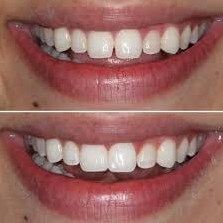What is dental bonding? Do I need dental bonding?

What is dental bonding?
Dental bonding is a procedure where a dentist applies a tooth-colored material to your teeth to improve the appearance of your smile. This can be beneficial if you have small chips or stains in your teeth. In some cases, dental bonding is beneficial if you want to change the shape of your teeth or close small gaps between your teeth.
&srotate=0)
What is the process of dental bonding?
The process of having dental bonding done begins with a consult. Your dentist will need to know all the ways in which you would like to improve your smile. Sometimes, it takes more than just bonding to achieve your dream smile. Your dentist may consider alternatives, such as Invisalign, traditional veneers, or whitening treatments, depending on your teeth, habits, and desires for your smile.
If your dentist determines you are a good candidate for dental bonding, they may offer you a preview of your new smile, whether by placing temporary material over your teeth or a virtual smile makeover. If you decide you like the look of your new smile, the next step is the actual bonding.
The process of bonding is so conservative that your dentist will likely not need to numb you. Your dentist will roughen the surface of your tooth, then clean off your tooth, and condition the surface with a liquid. They will then apply the tooth-colored material and mold it. Your dentist will then polish the surface.
What are the benefits of dental bonding?
Many patients choose dental bonding as a less expensive alternative to traditional veneers. Bonding is minimally invasive, with very little preparation of the tooth needed.
What are the disadvantages or considerations of dental bonding?
Dental bondings chip and stain much easier than traditional veneers. It is important to tell your dentist if you have certain habits, like drinking wine, coffee, tea, or biting your nails and grinding your teeth. Each of these would be a reason to consider alternative methods for achieving your dream smile. It is also important to know that dental bondings will not be whitened with traditional whitening procedures. So if your back teeth are stained, you should consider whitening all of your teeth to your ideal shade prior to considering dental bonding.
Kenneth A. Ingber, D.M.D., P.C.
2021 K Street, N.W.
Suite 720
Washington, D.C. 20006
202-331-7474